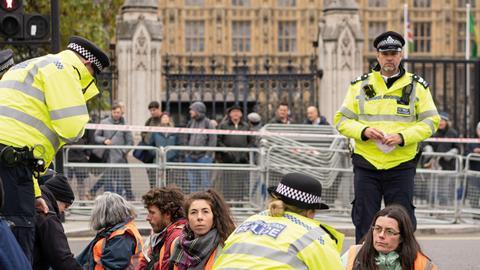
As many will have seen in the media, environmental activist group Insulate Britain (IB) has carried out London protests in a manner deliberately designed to cause serious disruption. These protest tactics have included activists deliberately blocking highways by sitting down in the road, and often gluing themselves to its surface and/or locking themselves to each other to make their removal more time-consuming. IB has repeatedly stated that these protests will continue until its demands are met.
These demands are: first, that the government immediately promises full funding and assumption of government responsibility for the insulation of all social housing in Britain by 2025; and second, that the government immediately promises to produce within four months a legally binding and fully funded national government plan for a full low-energy and low-carbon whole-house retrofit of all homes in Britain by 2030.
Consequently, Transport for London (TfL) sought a final injunction against 129 of 138 named defendants and certain defined persons unknown. The injunction sought an order preventing protest blocking of specified roads and areas in a significant part of the TfL strategic road network. The locations in question include bridges or ‘junctions of great importance’ and surrounding access roads, as well as certain longer protected stretches of road such as the A4 and the North Circular. The case came before Morris J on 29-30 March and on 3 May he gave judgment in Transport for London v Persons Unknown and others [2023] EWHC 1038 (KB).
TfL made its injunction claim pursuant to its duty under section 130 of the Highways Act 1980 (protection of public rights) ‘to assert and protect the rights of the public to the use and enjoyment of any highway for which [it is] the highway authority’ and on the basis that the conduct of the defendants in participating in the IB protests constitutes: (i) trespass; (ii) private nuisance; and/or (iii) public nuisance. The claimant’s evidence was that the protests of IB and Just Stop Oil (a similar group) ‘have been very dangerous and disruptive, creating an immediate threat to life, putting at risk the lives of those protesting, those driving on the roads and those policing the protests’. Moreover: ‘At times, the protests have also caused a risk of violence between protesters and ordinary users of the highways.’
Morris J said that he was satisfied on the evidence before him that, subject to material considerations arising under articles 10 (freedom of expression) and 11 (freedom of assembly and association) of the European Convention on Human Rights, the conduct, both in the past and threatened in the future, of the defendants in protesting on the relevant roads by deliberately blocking and obstructing those roads, prima facie constitutes the torts of trespass, private nuisance and public nuisance. Regarding trespass, the protesters directly enter on to the claimant’s land other than for the purpose of exercising a public right of way.
As to private nuisance, ‘the protests cause a substantial and unreasonable interference with the enjoyment and exercise of the rights of way of other road users’. And, in respect of public nuisance, the protests prevent the public from freely, safely and conveniently passing along the relevant highways, the actions deliberately causing a physical obstacle on the roads, rendering them impassable or more difficult to pass along.
The court was also satisfied on the facts that there is a real and imminent risk of further protests on the part of the defendants. For IB has repeatedly stated that it will continue to protest and will not be discouraged by injunctions. Also (with specific exceptions) the fact that none of the named defendants has sought to engage with the proceedings suggested that there was no arguable defence to the claimant’s claim. The final injunction sought in relation to the named defendants was not restricted to IB protests but to those under any other banner. Damages would also not be an adequate remedy.
As to the position of persons unknown, on the particular facts and circumstances and in the light of the guidelines specified in Canada Goose UK Retail Ltd v Persons Unknown [2020] EWCA Civ 303, the court was also ‘satisfied that it is just and convenient to grant the final injunction against the persons unknown’.
However, a disruptive protest which obstructs the highway may be lawful under articles 10 and 11 unless (among other things) the interference with these rights is in pursuit of a legitimate aim and is ‘necessary in a democratic society’ so that a fair balance is struck between the legitimate aim and the requirements of freedom of expression and freedom of assembly. Among the proportionality considerations is whether there is a fair balance between the rights of the individual and the general interest of the community including the rights of others.
Morris J considered (among other things) that the aims of preventing obstruction of the public on the relevant highways and preventing violence and danger which occur when this is jeopardised are sufficiently important to justify interference with the defendants’ rights. There was also no less restrictive or alternative means to achieve the prevention of obstructive and disruptive protests other than a final injunction in the form sought. The court therefore gave judgment for the claimant for a final injunction in the terms of the draft order before the court. To protect the public and the claimant’s rights, the final injunction will last for five years, with the court reviewing yearly ‘for supervisory purposes’.
Nicholas Dobson writes on local authority law and governance
































No comments yet